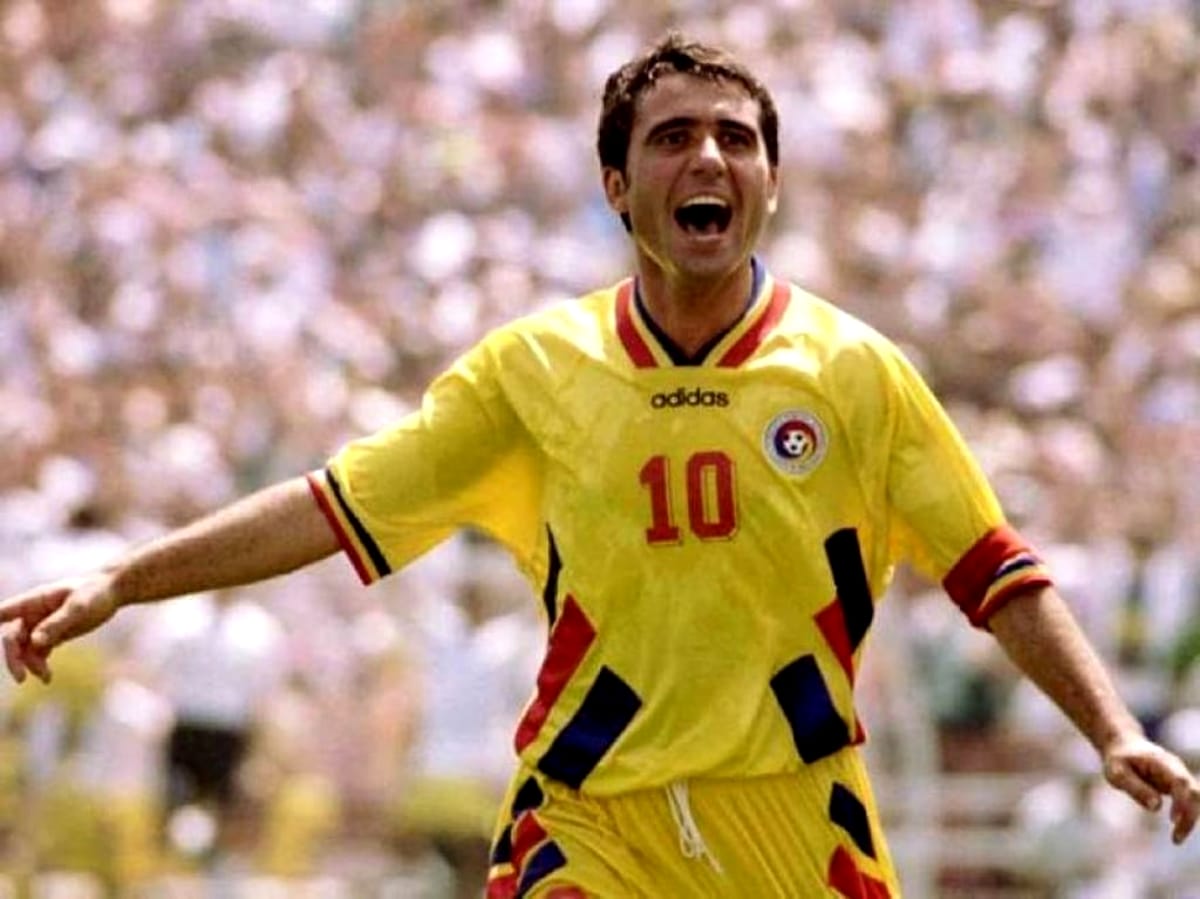Gheorghe Hagi: The Maradona of the Carpathians
Gheorghe Hagi is widely regarded as one of the greatest Romanian football players of all time and one of the best left footed players that ever played the beautiful game.

I. Introduction
Gheorghe Hagi is widely regarded as one of the greatest Romanian football players of all time and one of the best left footed players that ever played the beautiful game. He is a record breaker for the Romanian National Team and played for several high-profile European football clubs, including Real Madrid, FC Barcelona or Galatasaray. Hagi's talent and skill on the field earned him the nickname "the Maradona of the Carpathians".
A talented left-footed attacking midfielder, Hagi's playing style was frequently compared with Diego Maradona's throughout his career, due to his technical ability as well as his temperamental character and leadership. A quick, agile, creative, and mobile advanced playmaker, Hagi was also tactically versatile, and capable of playing in several midfield and offensive positions on either wing or through the middle, due to his ability with both feet, despite being naturally left-footed, although he had a preference for using his stronger foot; his preferred position was in a free role as a classic number 10, but he was also used as a second striker on occasion.
Hagi was renowned in particular for his first touch and speed on the ball, as well as his timing, interpretation of space, bursts of acceleration, agility, quick feet, balance, flair and dribbling skills, which enabled him to get past defenders; he was also highly regarded for his vision and precise passing, although he was capable of both scoring and assisting goals, and was also an accurate finisher and set-piece taker, who had a penchant for scoring goals from powerful, bending long range strikes. Despite his small stature and slender build, Hagi possessed significant upper body strength, which, along with his control, aided him in protecting the ball from opponents, and allowed him to create space for himself or his teammates.
II. Early Life and Career
Gheorghe Hagi was born on February 5, 1965, in Săcele, a small town in Romania. He started playing football at a young age and quickly showed promise. Hagi's father, also a football player, recognized his son's talent and supported him in pursuing his passion.
In 1982, Hagi began his senior career with FC Farul Constanta, a club in Constanta, Romania. He made his debut at just 16 years old, becoming the youngest player in the club's history to do so. Hagi quickly established himself as a talented midfielder, and his performances caught the attention of Romania's top clubs.
European Success with Steaua Bucharest
In 1987, Hagi joined Steaua Bucharest, Romania's most successful football club. He made an instant impact to the team, scoring the only goal in the European Super Cup played against Dinamo Kiev. It was with Steaua that Hagi really began to make a name for himself. He played a key role in the team's success in the domestic league and helped them reach the final of the European Cup in 1989. The team had a difficult route to the final, knocking out the likes of Sparta Prague and Galatasaray. In the final, they faced an AC Milan side that featured the likes of Franco Baresi, Paolo Maldini, and Ruud Gullit. Despite Hagi's best efforts, Steaua were beaten 4-0 by a dominant Milan side. Although Steaua lost the final, Hagi's performances in the competition caught the attention of top European clubs.
III. International Career
Gheorghe Hagi was an important player for the Romanian national team, and helped the team achieve success during his time with them. He made his debut for the team in 1983 in a match against Norway, and went on to earn a total of 125 caps, scoring 35 goals for his country.
Hagi was a key player for Romania throughout the 1980s and 1990s, helping the team qualify for three consecutive World Cup tournaments in 1990, 1994, and 1998, as well as the European Championship in 1984, 1996 and 2000. The Romanian national team generation of Hagi is often called the Golden Generation as the team qualified for 5 out of 6 possible final tournaments between 1990 and 2000 and recorded also the team's best results in history, winning multiple games against big teams like Colombia, Argentina or England.
In 1994, at the FIFA World Cup organized in the United States of America, Gheorghe Hagi captained the Romanian National team to their best performance in history, a quarter final against Sweden, also being named in the World Cup All-Star Team. At this tournament he scored a magical goal against Colombia in the Group Stages and then led Romania to their most important win in history, a 3-2 thriller against Argentina in the Round of 16.
Hagi retired from international football in 2000, following Romania's failure to qualify for the Euro 2000 tournament. He remains one of the most iconic players in the history of Romanian football, and is widely regarded as one of the greatest players to ever represent the national team.
IV. Club Career Abroad
Gheorghe Hagi's move to Real Madrid in 1990 was a highly anticipated one, but his stint there was a mixed bag of successes and disappointments. In Spain he wore the number 10, the number offered to the best player in the team at that time and played with players like Butragueno and Hierro. During his 2 years at Real Madrid, Hagi only won a Spanish Super Cup.
Following his departure from Real Madrid in 1992, Hagi joined Italian club Brescia, where he enjoyed a successful two-year stint. He then made a move to Barcelona in 1994, but again, his time there was marked by a series of conflicts with the club management, and he was sold to Galatasaray in 1996.
It was at Galatasaray where Hagi truly shone, leading the team to four consecutive domestic titles and a memorable UEFA Cup victory in 2000. Hagi captained the Galatasaray team which won that night the first European Trophy for a Turkish club after defeating a much stronger Arsenal London side after penalties. The team's UEFA Cup triumph was immediately followed by the UEFA Super Cup title, with a historic 2–1 win against Hagi's former club Real Madrid in extra-time. The mass hysteria caused by these wins in Istanbul raised Hagi's popularity with the fans even further, and prompted former France international Luis Fernández to say, "Hagi is like wine, the older it gets, the better it is."
V. Hagi as a Coach
In 2001, Hagi was named the manager of the Romania national team, replacing Ladislau Bölöni, who left the squad to coach Sporting Clube de Portugal. After failing to qualify the team for the World Cup, Hagi was sacked. His only notable achievement during the six months as Romania's manager was the win in Budapest against Hungary.
Hagi then became manager of Galatasaray in 2004, leading the team to the Turkish Cup in 2005 final with 5–1 as a score against fierce rivals Fenerbahçe. His contract, however, was not renewed since his team was not able to win 2004–05 Süper Lig title over Fenerbahçe during the centennial of the club.
In September 2014, Hagi appointed himself manager of Viitorul Constanța, in addition to being the owner and chairman of the club. Successfully avoiding relegation in his first season, Viitorul went on to be the season's wonder in the 2015–16 season, finishing the first half of the regular season on 3rd place, which led Hagi to be named Romania Coach of the Year. Viitorul won their maiden league title, being 2016–17 Liga I champions after a 1–0 home victory over CFR Cluj; they finished the play-off with 44 points, same as FCSB, but on a better head-to-head record after a 3–1 home victory over FCSB. As a result, Hagi won his second Romania Coach of the Year award.
VI. Legacy and Honors
Gheorghe Hagi also established the Gheorghe Hagi Football Academy in his hometown of Ovidiu, Romania in 2009. The academy aims to develop young football talents and provide them with professional training and education. The academy has multiple pitches and training facilities, as well as classrooms and dormitories for the students. The academy has produced several successful players, including Ianis Hagi, Gheorghe's son, who currently plays for Rangers in Scotland. The academy has also received recognition from UEFA and is considered one of the best youth football academies in Europe. Through the academy, Hagi is continuing to make a significant contribution to the development of football in Romania and beyond.
During his career, Hagi won multiple trophies and honors, both as a player and as a coach. Here is a list of his most important achievements:
Player
Steaua Bucharest
- Romanian First Division: 1986–87, 1987–88, 1988–89
- Romanian Cup: 1986–87, 1988–89
- European Super Cup: 1986
- Intercontinental Cup runners-up: 1986
- European Cup runners-up: 1988–89
Real Madrid
- Spanish Super Cup: 1990
Brescia
- Anglo-Italian Cup: 1993–94
Barcelona
- Spanish Super Cup: 1994
Galatasaray
- Turkish First Division: 1996–97, 1997–98, 1998–99, 1999–2000
- Turkish Cup: 1998–99, 1999–2000
- Turkish Super Cup: 1996, 1997
- UEFA Cup: 1999–2000
- UEFA Super Cup: 2000
Manager
Galatasaray
- Turkish Cup: 2004–05
Viitorul Constanța
- Romanian First Division: 2016–17
- Romanian Cup: 2018–19
- Romanian Super Cup: 2019
Individual
- Romanian First Division top scorer: 1985, 1986
- European Cup top scorer: 1987–88
- Gazeta Sporturilor Romanian Footballer of the Year: 1985, 1987, 1993, 1994, 1997, 1999, 2000
- FIFA World Cup All-Star Team: 1994
- Ballon d'Or: 4th place 1994
- FIFA XI: 1998
- Turkish Footballer of the Year: 1996, 1999, 2000
- World Soccer Magazine's 100 Greatest Players of the 20th century: 1999 (#25)
- UEFA Jubilee Awards – Greatest Romanian Footballer of the last 50 Years: 2003
- FIFA 100: 2004
- Golden Foot Legends Award: 2015
- Romania Coach of the Year: 2015, 2017
VII. Conclusion
Gheorghe Hagi will always be remembered as one of the greatest football players of all time. His technical skills, vision, and ability to create and score goals were unparalleled. His performances on the pitch, particularly with Steaua Bucharest and Galatasaray, have become legendary and have cemented his place in football history.
Hagi's success with the Romanian national team and his impact on football in Romania cannot be overstated. He inspired a generation of players and fans in his home country and put Romanian football on the map. His contributions to the game were also recognized globally, as he earned numerous individual awards and accolades throughout his career.
Beyond his playing career, Hagi has continued to make significant contributions to football through his coaching and the establishment of his own football academy. His legacy as a player and coach will continue to inspire and shape the future of football for generations to come.

